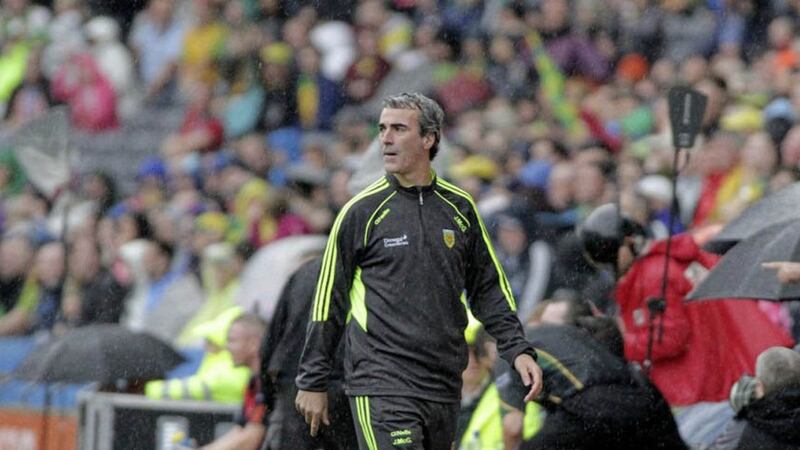THERE is an in-built snobbery in every sport. You’ll find it in the GAA, boxing and soccer. Everywhere.
Right now there are vast numbers of soccer people looking down their noses at Jim McGuinness.
Who does he think he is?
He might have revolutionised Gaelic football but he doesn’t have the knowledge or wherewithal to be a success in the beautiful game.
Soccer is too cultured, too intricate for a GAA manager.
And so it goes.
After spells at Celtic – where he moved from a mentoring role at U16 level to some coaching – and a brief stint at Beijing Sinobo Guoan FC, Donegal’s All-Ireland winning manager was unveiled as head coach of Charlotte Independence of Colorado, a second tier club in America.
It’s understood Derry City and Galway United made enquiries about his availability, but McGuinness opted for a bigger challenge, stateside.
Speaking with former Donegal defender Eamon McGee earlier this week, he feels if being a successful soccer coach came down to “drive and belief” his former manager would be an A-lister.
“I don’t know what Jim’s [soccer] knowledge and coaching ability is like,” said McGee, “but I just know about his drive and his belief – if he can give that to any team he has an advantage straight away.
“But obviously there’s a lot more to it than drive and belief.
“I’d imagine that soccer players and Gaelic players would be a bit different. I saw a side to Jim, and a few others did as well, where he just cut through you.
“I wouldn’t be disrespectful to soccer players but any I’ve had experience of they’re not able to take that kind of criticism.”
McGee added: “There is not a lot of men that have his belief and he’ll keep going and going. He could have taken the easy option and said soccer wasn't for him, but he didn’t want any Gaelic football job in the country.
“He’s gone for the soccer and he’s going to test himself. We’ll chat again in five years and say it didn’t work out or he’s going to make it.”
McGuinness readily acknowledges he doesn’t come from a soccer background, so people automatically wonder and question the wisdom of his decision to choose a coaching career in a game he has no organic link to.
“I’m not a guy who spent all my childhood around a soccer pitch with my dad being a soccer coach,” McGuinness said. “I’m not that kid, I’m another kid.”
The big variable in the equation is how well McGuinness’s skills set transfers to another code.
It’s also worth noting that quite a number of elite soccer managers had undistinguished playing careers.
Arsene Wenger and Jose Mourinho didn’t exactly pull up trees during their playing days, with the latter starting out as Bobby Robson’s interpreter at Barcelona before evolving into a serial domestic League and Champions League winner.
Arrigo Sacchi didn’t play at any notable level but revolutionised Italian football as manager of AC Milan.
The high press wasn't invented by Pep Guardiola.
Sacchi’s brilliant Milan sides were pressing high up the pitch back in the late 1980s, making ‘Catenaccio’ look decidedly outdated in the process.
Of course, some observers point to the high amount of world-class players Sacchi had at his disposal at the lauded San Siro – Franco Baresi, Paolo Maldini, Ruud Gullit and Marco van Basten – which is more power to the manager he was able to command their respect, particularly with a new set of guiding principles at the time.
In many ways, the time is perhaps ripe for someone like Jim McGuinness.
His approach in winning the 2012 All-Ireland with his native Donegal was very prescriptive. Soccer has become equally prescriptive.
Coaches in either code are obsessed with zones. The game is all about zones: how to man them, how to get around them, and obviously being able to counter-attack well.
There is now more than ever major theoretical overlap between soccer and Gaelic football with the high press having a similar impact in both codes.
Charisma helps too.
McGuinness has bucket loads of it.
He could charm the birds from the trees and make free spirits like Eamon McGee change course.
He has proved one of the best students of Gaelic football there has ever been.
In 100 years time, his remarkable achievement of guiding Donegal to an All-Ireland title in 2012 – nearly two in 2014 – will be held up as an example that anything is possible in sport.
Not only great soccer players cut it in the dugout. Roy Keane is case in point.
After failing at Ipswich Town, he was asked at his unveiling as Republic of Ireland assistant manager in late 2013, where he went wrong in his managerial career, he immediately replied recruitment.
Recruitment can make or break a club manager. And Keane’s wasn’t good enough at Ipswich, and he was soon sacked.
McGuinness can bring all the blueprints and tactical game plans to Charlotte Independence, but to get off first base his recruitment is absolutely crucial.
Of course, it could transpire McGuinness has bitten off more than he can chew and he might be back patrolling the sidelines of Ballybofey and Clones before too long.
Then again, somebody has to land these big jobs in soccer.
Why not the man from Glenties?
After all, the beautiful game isn’t as complicated as some people would have you believe.







